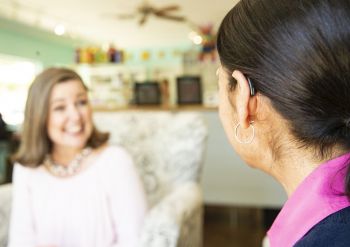|
www.HealthyHearing.com |
I hate my hearing aids. What do I do?How to love your hearing aids
Contributed by Debbie Clason, staff writer, Healthy Hearing, and Emily Ostrowski, content manager, Healthy Hearing So you’ve received the hearing aids your hearing health professional prescribed for you—and you hate them. What now? Should you leave them in your nightstand and decide to live with hearing loss? 
weeks, or even months, to get used to wearing hearing aids, and then soon find them invaluable. Absolutely not! It's important to wear your hearing aids consistently to get the most benefit and to reduce the negative consequences of untreated hearing loss. At the same time, it's important to feel satisfied with your treatment. The good news is, there are steps you can take to stop hating your hearing aids and even learn to love them. Why people don't like their hearing aidsWhile everyone is unique, Martin Case, a hearing instrument specialist and founder of Fountain Hills Hearing Health in Fountain Hills, Ariz., said there are three primary reasons why people aren’t satisfied with their hearing aids:
The good news is that all these can be addressed, especially when you’re working with an experienced hearing healthcare professional. How to love your hearing aids1. Be patientCompared to eyeglasses, hearing aids take time to get used to, as your brain relearns sounds it's forgotten about. You also have to get used to the sensation of something in your ears. Start slow but be consistent in your use, and know that it's normal for there to be an adjustment phase. 2. Make sure your own voice sounds rightIf your voice with hearing aids sounds different than you expected—tinny, for example—talk to your provider. They might be able to make some adjustments to your devices to help your voice sound more natural. 3. Make sure hearing aids fit comfortably in your earsAlthough hearing aids typically take time to get used to, they shouldn’t be painful to wear. If they are uncomfortable or the amplification is too loud, ask for an adjustment from your hearing center. 4. Know how to insert your devicesIf you’re having trouble putting your hearing aids in your ears, ask for help. Like most new things, there’s a learning curve—and practice makes perfect. 5. Change your perspectiveSometimes, dissatisfaction with your hearing devices can stem from being reluctant to get them in the first place. If that's the case, it can be helpful to shift your perspective. Instead of focusing on what you don't like, remind yourself of the good aspects. For example, that hearing aids provide important health benefits beyond helping you hear better, or that they make it easier for you to stay connected to your loved ones. 6. Communicate with your hearing health providerNot only can hearing health professionals determine how well you are hearing and help you identify the best hearing aid to treat your specific hearing loss, but they can also provide follow-up care to make sure your devices fit well and work as prescribed. If you have hearing aids but aren’t wearing them, have an honest conversation with your hearing healthcare professional about what's bothering you. “Good care from a caring provider makes all the difference,” Case said. “I’ve found if patients have really good technology and follow-up care, it can help the patient help themselves.”

Consider auditory rehabilitationIf you haven’t been hearing well for awhile, chances are you’re going to need some type of aural rehabilitation in addition to hearing aids. Just as muscles atrophy when they haven’t been used in awhile, so too does our auditory system. It needs “exercising” to regain what it’s been missing. Many hearing healthcare professionals include some aspects of aural rehabilitation with their care. At Fountain Hills Hearing Health, Case conducts a communication assessment before the hearing evaluation to make sure that the technology he prescribes will perform to expectations. He also schedules follow-up appointments to determine if there are areas for improvement. Most aural rehabilitation programs include a hearing loss management program that may provide the following:
Prioritize your hearing healthWhether you've been struggling to adapt to your hearing aids or have been putting off addressing your hearing concerns, it's important to make your hearing health a priority. The right provider can help find a treatment option that meets your individual needs and brings joy to your life. “Don’t give up. That’s the main thing,” Case said. “There is help and hope for a better life.” For help in finding a qualified professional in your community, visit our directory of hearing healthcare professionals and hearing centers. More: Hearing aid users share the surprising sounds they can now hear Debbie Clason, staff writer, Healthy Hearing
Emily Ostrowski, content manager, Healthy Hearing
|
Featured clinics near me
Hearing Health Solutions from Ohio ENT - Columbus
974 Bethel Rd Ste B
Columbus, OH 43214
Earzlink Hearing Care - Reynoldsburg
7668 Slate Ridge Blvd
Reynoldsburg, OH 43068


Find a clinic
We have more hearing clinic reviews than any other site!


 Debbie Clason holds a master's degree from Indiana University. Her impressive client list includes financial institutions, real estate developers, physicians, pharmacists and nonprofit organizations.
Debbie Clason holds a master's degree from Indiana University. Her impressive client list includes financial institutions, real estate developers, physicians, pharmacists and nonprofit organizations.
 Emily is an experienced journalist and medical content writer based in Maine. Passionate about delivering enlightening and accurate content, she is committed to empowering people to make informed choices regarding their hearing health.
Emily is an experienced journalist and medical content writer based in Maine. Passionate about delivering enlightening and accurate content, she is committed to empowering people to make informed choices regarding their hearing health.